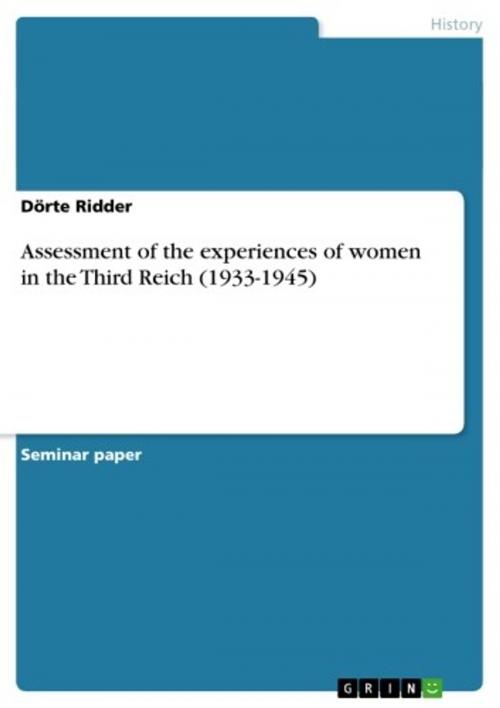| Author: | Dörte Ridder | ISBN: | 9783638612326 |
| Publisher: | GRIN Verlag | Publication: | February 20, 2007 |
| Imprint: | GRIN Verlag | Language: | English |
| Author: | Dörte Ridder |
| ISBN: | 9783638612326 |
| Publisher: | GRIN Verlag |
| Publication: | February 20, 2007 |
| Imprint: | GRIN Verlag |
| Language: | English |
Seminar paper from the year 2004 in the subject History Europe - Germany - National Socialism, World War II, grade: 2,1, University of Sunderland (School of Arts, Design, Media and Culture), 14 entries in the bibliography, language: English, abstract: Introduction 'Women have the task of being beautiful and bringing children into the world, and this is by no means as coarse and old-fashioned as one might think.' The aims of the National Socialist women policy have not been as simple as Goebbels puts it in 1939. On the contrary, they were contradictory. Firstly, the regime wanted to reduce women to their biological function. Their central task was breeding. This procreation policy bore two major advantages: It helped the Nazis in pursuing their racial policy of purifying the Aryan race and it provided a means for a decrease in the mass unemployment, as married women were supposed to give up their jobs. Secondly, this family-orientated policy aimed at recording women and girls as party members and to organise them for this purpose in Frauenverbaende (women's associations). A complete change of this policy took place by the outbreak of World War II and during the war years. 'Total war' forced the Nazis to abandon the domestic ideal for women; hence a total mobilization of female labour was attempted although this led to a contradiction within Nazi ideology. 'The intention of the conservative revolution to return women to the home had to be subordinated to other ideological goals - industrial expansion and war preparation.' The following essay will examine the development of Nazi policy towards women and will, on the basis of primary sources, assess the experiences of women in the Third Reich from 1933 until 1945. [...]
Seminar paper from the year 2004 in the subject History Europe - Germany - National Socialism, World War II, grade: 2,1, University of Sunderland (School of Arts, Design, Media and Culture), 14 entries in the bibliography, language: English, abstract: Introduction 'Women have the task of being beautiful and bringing children into the world, and this is by no means as coarse and old-fashioned as one might think.' The aims of the National Socialist women policy have not been as simple as Goebbels puts it in 1939. On the contrary, they were contradictory. Firstly, the regime wanted to reduce women to their biological function. Their central task was breeding. This procreation policy bore two major advantages: It helped the Nazis in pursuing their racial policy of purifying the Aryan race and it provided a means for a decrease in the mass unemployment, as married women were supposed to give up their jobs. Secondly, this family-orientated policy aimed at recording women and girls as party members and to organise them for this purpose in Frauenverbaende (women's associations). A complete change of this policy took place by the outbreak of World War II and during the war years. 'Total war' forced the Nazis to abandon the domestic ideal for women; hence a total mobilization of female labour was attempted although this led to a contradiction within Nazi ideology. 'The intention of the conservative revolution to return women to the home had to be subordinated to other ideological goals - industrial expansion and war preparation.' The following essay will examine the development of Nazi policy towards women and will, on the basis of primary sources, assess the experiences of women in the Third Reich from 1933 until 1945. [...]















